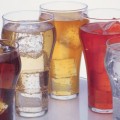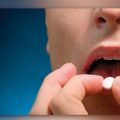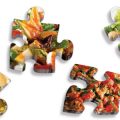Foods That Burn Fat
Fact Or Fiction?
By Amy Campbell, MS, RD, LDN, CDE
“If you lost a little bit of weight, your diabetes would be better.”
How many times have you heard these words from your health care provider? Part of the advice given to people with type 2 diabetes is to eat right, exercise more and lose weight. But we know it’s often easier said than done. Losing weight is possible, but it is hard work. Wouldn’t it be great if you could eat certain foods and the pounds would just melt away? Do any foods really burn fat or help with weight loss? Let’s take a look at foods that have been called “fat burners” so you can decide if they really are— or aren’t.
» DAIRY FOODS
Can eating cheese and yogurt and drinking milk help you shed pounds without having to slash your calorie intake? A study sponsored by the National Dairy Council and published in 2004 showed that a group of overweight adults who consumed 1,200–1,300 mg of calcium from milk, cheese and yogurt lost more weight than another group who got calcium from supplements and a third group who had a low intake of both dairy foods and calcium. But other studies have not shown the same effect.
Bottom line: Eating one serving (8 ounces of milk, yogurt or nonfat or low-fat dairy foods) three times daily as part of a lower-calorie eating plan may enhance weight loss.
» Apples and pears
Eating at least three small apples or pears every day may help you lose weight, based on findings from a Brazilian study. In this study, overweight women who ate three apples or pears every day as part of a lower-calorie diet lost more weight and had a greater drop in blood glucose than women who didn’t eat apples or pears. The “apple/ pear eaters” took in fewer calories, probably due to the fiber content of the fruit. Bottom line: As the saying goes, “an apple a day keeps the doctor away.” Foods high in fiber, such as fresh fruit, may promote weight loss because they can help fill you up so you eat less.
» EGGS
Eggs have been called “nature’s perfect food.” Eggs offer protein, B vitamins, and vitamins A, D and E, along with other nutrients that we need for good health. Several studies have shown that eating eggs can be helpful if you are trying to lose weight. Eggs provide high-quality protein, which can prevent the loss of lean body mass, or muscle. Eggs also can help you feel full so you eat less. In fact, a recent study showed that eating eggs for breakfast helped people cut their daily caloric intake by up to 18 percent and helped them lose 65% more weight than another group of people who ate bagels for breakfast.
Bottom line: Eggs contain cholesterol (actually, only the yolk has cholesterol) but they can still be part of a heart-healthy eating plan. It’s really saturated fat that raises blood cholesterol the most, not the cholesterol found in food. And egg whites have no cholesterol at all, just protein. One egg contains only 70 calories, 5 grams of fat and no carbohydrates, and may help you to eat less and lose weight.
» APPLE CIDER VINEGAR
Vinegar’s roots as a folk remedy date back to 400 B.C.E. It is said it helps treat many health issues, such as arthritis, warts, sunburn, urinary tract infections, ulcers, hiccups and, of course, being overweight. Not surprisingly, there is an “apple cider vinegar diet” where you drink apple cider vinegar before each meal. Does drinking vinegar help you lose weight? Animal studies have shown that vinegar can prevent fat buildup in the body. And in a Japanese study, obese people were given different amounts of vinegar or fake vinegar (placebo). The vinegar-drinkers had a lower body weight, body mass index and waist size than the placebo drinkers at the end of the study.
Bottom line: Adding vinegar to your meal plan (as a salad dressing or a marinade, for example) may or may not help you lose weight. However, vinegar has no calories, no carbohydrates and no fat, so it’s a good food seasoning. And because it’s an acid, vinegar can help slow the rise in blood glucose after eating. Taking a teaspoon in a glass of water at bedtime may result in lower morning blood glucose levels. But use vinegar carefully, as eating too much may irritate your mouth, throat or stomach.
» OATMEAL
Eating a bowl of oatmeal may not only help you lower your cholesterol, it may help you shed some pounds, too. Oatmeal is high in a type of fiber called soluble fiber. Soluble fiber helps to lower blood cholesterol and blood glucose. It also slows the rate at which food leaves your stomach, so that you’re less likely to be hungry. And when you’re not hungry, you usually end up eating less.
Bottom line: Try including oatmeal in your eating plan at least several times a week. Not a big fan of oatmeal? You can get soluble fiber from other foods, too, including dried beans and peas, barley, and oranges and apples.
» HOT PEPPERS
Jalapeño, Scotch bonnet, cayenne and chili are types of hot peppers. They get their heat from a substance called capsaicin. Capsaicin sometimes is used in ointment form to help relieve pain. Some studies show that it can also help speed up your metabolism, or the rate at which you burn calories. In fact, spicy foods in general may help you burn more calories by making you feel fuller. One study showed that men who seasoned their food with hot sauce ate 200 fewer calories than men who didn’t use hot sauce.
Bottom line: If you can take the heat, stock up on hot peppers, hot sauce, red pepper flakes and other spicy foods. Go easy, though, if you suffer from heartburn or ulcers.
Food, in general, doesn’t “burn” fat. But, the foods mentioned above may make it easier for you to lose weight—and keep it off. If you need more help or have other questions, ask for a referral to a dietitian who can help you fit higher-fiber, higher-protein foods into your eating plan.













